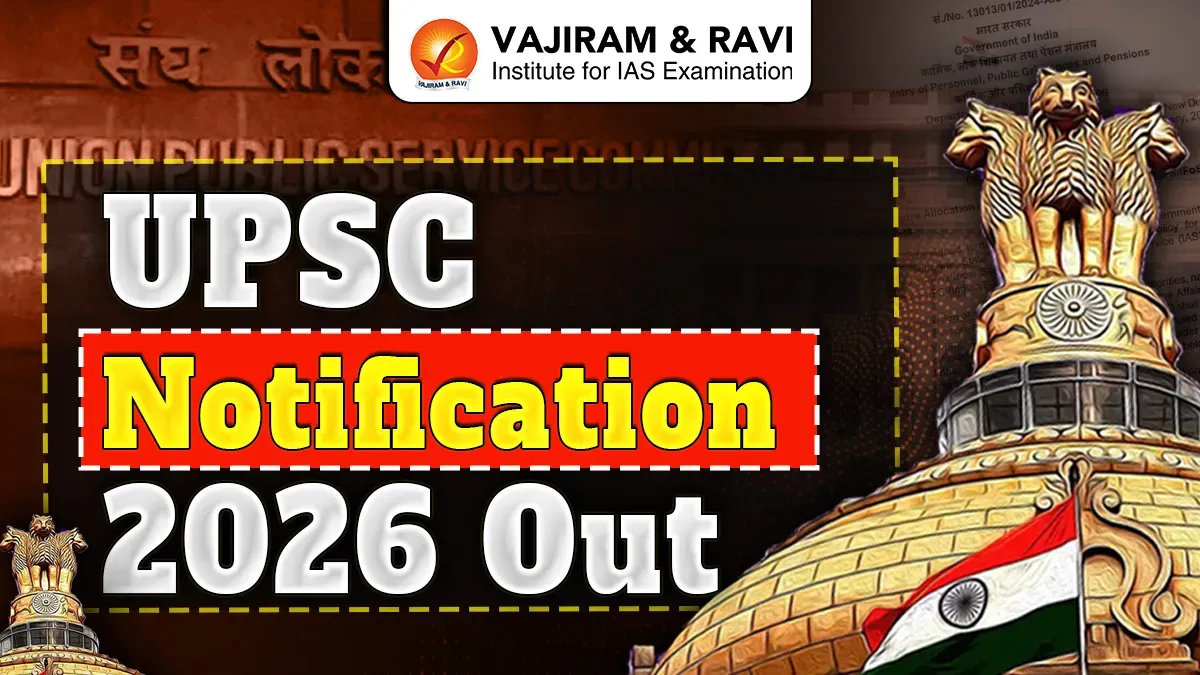Vajiram & Ravi’s UPSC Exam Preparation Resources & Strategy
Vajiram & Ravi equips UPSC aspirants with expert-curated study material and test series. Our resources include Daily Current Affairs in the form of Prelims Pointers, Mains Articles, Editorial Analysis, Daily MCQs, and the monthly UPSC current affairs magazine The Recitals. Sourced from The Hindu, The Indian Express, Yojana and Kurukshetra Magazine, Down to Earth and other important sources our notes offer concise insights for objective questions and in-depth analysis to enhance answer writing. With a strategic approach and high-quality content, Vajiram & Ravi is your trusted partner in UPSC preparation.

UPSC Calendar 2026 Out, Check CSE Exam Date, Download PDF
UPSC Calendar 2026 has been released. Download the UPSC Calendar 2026 PDF to stay updated on important events such as notifications, exam schedules, and key deadlines.

UPSC Calendar 2026 Out, Check CSE Exam Date, Download PDF
UPSC Calendar 2026 has been released. Download the UPSC Calendar 2026 PDF to stay updated on important events such as notifications, exam schedules, and key deadlines.
UPSC Notes 2026
To help aspirants excel in UPSC 2026, Vajiram and Ravi have curated Quest UPSC Notes prepared by subject experts, ensuring thorough coverage of every aspect of the General Studies subject, ensuring comprehensive preparation which helps aspirants prepare well and increase the chances of qualifying the UPSC Exam 2026.
The General Subjects hold a significant importance in UPSC CSE 2026. Here you can access the Quest UPSC Notes which includes the GS Notes whose marks contribute to the final merit calculation. Whether it's excelling in dynamic topics or writing effective answers, these UPSC Notes have got you covered.
- Ethics
- Case Study
UPSC CSE 2026 Exam
The UPSC CSE 2026 Notification has been released on February 04, 2026. The UPSC CSE 2026 applicants will be offered a chance to work in various fields, including administration, law enforcement, and foreign services as well as contribute to the nation’s development. Students are suggested to focus on current affairs and refer Vajiram and Ravi’s Courses for UPSC as part of their preparation.
| UPSC CSE 2026 Exam | |
| UPSC CSE Notification 2026 | 04 February 2026 |
| UPSC CSE Selection Process 2026 |
Prelims Mains Interview |
| UPSC CSE Prelim Exam 2026 |
General Studies Paper I General Studies Paper II (CSAT) |
| UPSC CSE Mains Exam 2026 |
|
| UPSC CSE Interview 2026 | 275 Marks |
| UPSC CSE Vacancy 2026 | To be announced |
UPSC IFoS Exam 2026
Other than IAS and IPS, the Indian Forest Service (IFoS) is one of the most awaited All-India Services among aspirants. The UPSC Indian Forest Service (IFoS) Exam 2026 is conducted alongside the UPSC Civil Services Examination (CSE) to recruit Group A officers for India's forest and environmental management sector.
| UPSC IFoS Exam 2026 | |
| UPSC IFoS Notification 2026 | Out Soon |
| UPSC IFoS Selection Process 2026 |
Prelims Mains Interview |
| UPSC IFoS Prelims 2026 |
Paper 1 Paper 2 |
| UPSC IFoS Mains 2026 |
|
| UPSC IFoS Interview 2026 | 300 Marks |
| UPSC IFoS Vacancy 2026 | To be announced |
| Related Posts of UPSC IFoS 2026 | |
| UPSC IFoS Notification | UPSC IFoS Syllabus |
| UPSC IFoS Salary | UPSC IFoS Eligibility |
| UPSC IFoS Result | UPSC IFoS Cut Off |
| UPSC IFoS Selection Process | |
Why Choose Vajiram and Ravi for UPSC?
With over five decades of experience, Vajiram & Ravi has consistently produced UPSC toppers, reflecting our commitment to quality education and excellence. Our expert faculty, with deep subject knowledge and years of experience, ensures the best guidance for aspirants.
We offer a focused learning environment at our Delhi and Chennai centers, along with LIVE-online classes that provide an immersive classroom experience, making quality education accessible to students across the country.
Join us today and take the first step toward your UPSC dream. Enroll now to benefit from expert mentorship, top-quality resources, and a structured learning approach designed for success. Your UPSC journey begins here.
UPSC Exam FAQs
Q1. Will there be an UPSC exam in 2026?+
Q2. What is the schedule for UPSC 2026?+
Q3. Is optional removed from UPSC 202?+
Q4. How much vacancy in UPSC 2026?+
Q5. Can I crack UPSC in 1 year?+






